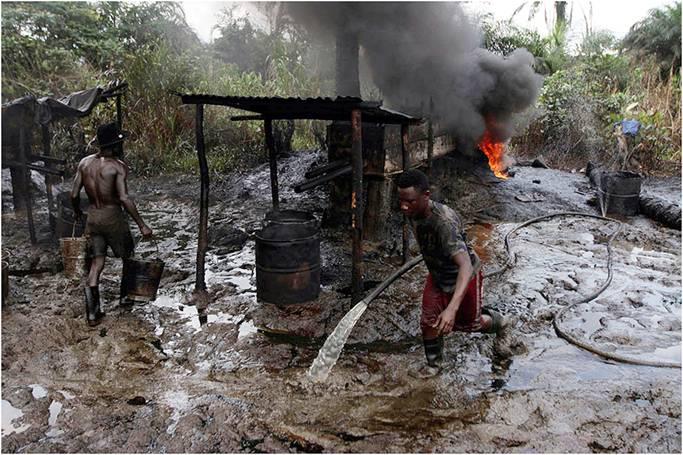The rising incidence of oil bunkering in the Niger Delta seems to have pushed militancy in the region to the back seat as most now turned to the trade, a venture they considered less risky than militancy,National Daily has gathered,
Unlike politically-driven militancy, where Niger Delta militants say they represent impoverished people in the Niger Delta region, stealing crude is considered a less risky option for those involved.
According to findings by National Daily,about 100,000 barrels a day are being taken out of pipelines, whereas militancy halted at least eight times that amount at one stage three years ago.
In his words, former head of Nigerian Extractive Industries Transparency Initiative, Ledun Mitee, oil theft employs at least 500,000 people in the country.
It was gathered that much of the stolen crude is processed in tiny, makeshift refineries comprising hundreds of cauldrons, each of which can hold as much as 150 barrels of oil, according to Nwanze. The world’s biggest refineries handle more than 1.2 million barrels each day.
ALSO READ: Gov Wike versus Nigerian Army: Nigerians express distrust over military ‘political partisanship’
The rogue refineries, essentially scaled up versions of widespread gin distilleries in the region, typically employ about 100 people working in shifts. Yields from a single cauldron will include 7,500 liters of diesel, 2,000 liters of gasoline and 500 liters of kerosene a day. It costs about 4 million naira ($11,100) to construct a boiling pot.
The increase reflects a belief among local communities that multinationals don’t really own the barrels in the first place, according to Ledum Mitee, a lawyer and minority rights activist.
“They believe the oil is theirs and the government is the thief,” he said. “People now realize that instead of just cutting pipelines to spite the government, they can make money out of it.”
“Oil theft is a severe drain on Nigeria’s revenue,” said Cheta Nwanze, the head of research at SBM Intelligence, a Lagos-based consultant. “The losses to theft could easily fund Nigeria’s budget deficit.”
Multiple incidents of force majeure, a legal measure that allows companies to forgo their contractual supply obligations, have happened this year in Nigeria — even if the precise causes often remain unclear. Brent crude traded at $61.85 a barrel as of 1 p.m. in London.
Aiteo Group, operator of the Nembe Creek Trunk Line to Shell’s Bonny export terminal, has been one of the hardest hit this year, halting flows through the link at least three times since January.
And the challenges doesn’t appear to be getting easier. Shell lost an average of 11,000 barrels a day to theft in 2018, it said. That’s up from losses of 9,000 barrels of crude a day in 2017.
Chevron Corp. has also reported problems with third-party interference on its production facilities.
Addressing the challenge requires a “holistic approach,” Nigeria’s Oil Minister Emmanuel Kachikwu said after attending a cabinet meeting in Abuja last month.
“Oil theft is rife because there is an economic gain to be made from it,” Kachikwu said. “So we want to shut those illegal gains by creating positive and legal economic opportunities.”

 Business7 days ago
Business7 days ago
 Business6 days ago
Business6 days ago
 Education7 days ago
Education7 days ago
 Football14 hours ago
Football14 hours ago
 Crime7 days ago
Crime7 days ago
 Covid-196 days ago
Covid-196 days ago
 Business7 days ago
Business7 days ago
 Latest4 days ago
Latest4 days ago

